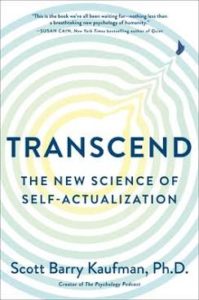

Maslow is most widely associated with a pyramid depicting needs, increasing from basic physiological and safety needs to esteem and self-actualization needs. Maslow, however, never created this pyramid and believed that these needs are much more fluid and individually and culturally variable than the pyramid model suggests. Kaufman argues that a more apt visual representation for humans’ needs is a sailboat to guide people in the direction of the good life. The boat itself represents our basic needs—for safety, connection, and self-esteem. The sail represents our growth-oriented needs—for exploration, love, and purpose.
Throughout Transcend Kaufman offers biographical information about Maslow that helps contextualize his theory and brings him to life in a sensitive and vivid way. Growing up in a working-class, immigrant family that faced discrimination and anti-Semitism, Maslow recognized that when basic needs go unmet individuals and society suffer. Inspired by his study of the Northern Blackfoot Indians on the Siksika reserve in Alberta, Canada, Maslow believed that people are fundamentally good. Maslow’s experience training with Harry Harlow, who is famous for studying maternal-separation, informed Maslow’s theory about the need for connection. Kaufman argues that Maslow believed himself to be a messiah-of-sorts, with critical counsel to offer to future generations. As a teacher Maslow was determined not only to enrich his students’ intellectual lives, but also to uplift them morally.
In reconstructing Maslow’s theory, Kaufman combines physiological and safety needs since recent research suggests that our physiological and psychological needs are entwined. For too many people basic physiological and safety needs are not met. Social isolation and loneliness are also commonly experienced and are associated with increased risk of death. The quantity of relationships in one’s life is less important than having relationships that offer a sense of mutual, unconditional positive regard. When one has meaningful connections with others and has accomplished meaningful goals, one can develop genuine self-esteem, take pride in one’s ambitions, and embracing one’s gifts.
Kaufman’s recent research about self-actualized individuals suggests that, much as Maslow theorized, the characteristics of self-actualization include truth-seeking, acceptance, purpose, authenticity, appreciation, humanitarianism, equanimity, and more. Kaufman found that these qualities are quite common.
Individuals who are more self-actualized are more motivated by growth, exploration, and a love of humanity. Growth and exploration take courage and can increase success. Maslow described mature love as involving caring for others, striving to alleviate suffering, and experiencing compassion. Healthy loving relationships balance each party’s need for individuality with the need for connectedness. The self-actualized individual has a purpose or calling that aligns with her talents, encourages her growth, and allows her to make positive contributions.
Transcendence, which often follows an emotional nadir, involves an integration of the whole-self, seeing sacredness in all things, loving wholeheartedly, and demonstrating wisdom. Kaufman argues that the science of transcendence suggests that society should be moving towards rewarding virtuous action, moving away from nationalism, inspiring awe in young people, and helping individuals discover their potential.
Inspired by both Maslow and more recent research, Kaufman offers a comprehensive set of suggestions for helping us become our whole, best selves. Facing our own mortality can renew our appreciation for the wonder of life and center our attention on our core values. Maslow, and in turn Kaufman, advise seeking out new experiences, especially with art and nature, and creating time for meditation. We can be compassionate with ourselves by embracing our past and our dark sides, thinking about how a loving friend views us, becoming aware of our complex personalities, and striving for growth. We should strive to increase gratitude and awe, admit ignorance, face our fears, take risks, and let go of perfectionism. We can better ourselves by helping others and cultivating our relationships through active listening and question asking.
To explore your own pattern of self-actualization visit Kaufman’s website: selfactualizationtest.com. Transcend offers a unique and powerful combination—intriguing insights into the science and theory of self-actualization and precious advice to guide you to becoming a better version of yourself.
Kaufman, S. B. (2020). Transcend: The New Science of Self-Actualization. TarcherPerigee.




